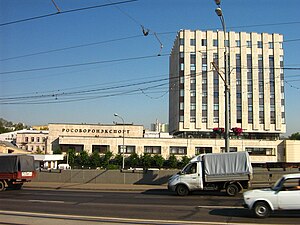Rosoboronexport
JSC Rosoboronexport (Russian: OAO Рособоронэкспорт) is the sole state intermediary agency for Russia's exports/imports of defense-related and dual use products, technologies and services. The corporation was set up by a Decree of the President of Russia and is charged with implementation of the policy of the State in the area of military-technical cooperation between Russia and foreign countries.
The official status of Rosoboronexport guarantees the support of the Russian Government in all export operations. The Rosoboronexport State Corporation is exclusively entitled to supply the international market the whole range of Russian armaments officially allowed for export.
Rosoboronexport is ranked among the leading operators in the international arms market. The status of a state intermediary agency provides the corporation with unique opportunities in expanding and strengthening long-term mutually beneficial cooperation with foreign partners.
Facts and figures

Rosoboronexport:
- Accounts for more than 90% of Russia's annual arms sales.
- Represents intellectual and production potential of Russian Defense Industrial Complex consisting of more than 1500 research institutes, design bureaus and manufacturing plants.
- Has cooperated with more than 60 countries during its 50-year history.
- Central headquarters in Moscow, representative offices in 44 foreign countries and in 26 major industrial regions in Russia.
- India is major client, other leading partners are China, Algeria, Vietnam, Venezuela and recently Iraq.[1]
Basic Trade Activities
- Export/import of military/dual use equipment and strategic raw materials.
- Logistics and maintenance, delivery of spare parts, tools and accessories, special liquids, fuels and lubricants required for proper operation of the supplied material.
- Technical assistance in construction of defense infrastructure, including arms manufacturing plants, airfields, depots, firing ranges, training centers, etc.
- Delivery of material, components, and parts for licensed arms production.
- Retrofits, upgrades and modernization of previously supplied weapon systems.
- Training of personnel in Russia and at Customer's facilities.
- Promotion of civil-purpose innovative technologies developed by the Russian defense industries.
History
Rosoboronexport is a legal successor of the state arms exporters existed in the ex-USSR and present-day Russia. A state intermediary agency in the military-technical area was first created on May 8, 1953, when the General Engineering Department within the Ministry of Internal and Foreign Trade of the USSR was founded in accordance with the decision of the Soviet Government.
With the scope of military industrial complex expanding, a number of new specialized export agencies were set up. By late 1990s, there were two state intermediary companies in the country, the Rosvooruzhenie and Promexport.
On November 4, 2000, the Rosoboronexport Unitary enterprise was set up by Decree №1834 of the Russian President, Vladimir Putin, as the sole state intermediary agency for Russia's military exports/imports.
On August 4, 2006, the Bush administration imposed sanctions on Rosoboronexport accusing it of supplying Iran in violation of the United States Iran Nonproliferation Act of 2000. The Russian defense ministry said the move reflected U.S. annoyance at arms sales to Venezuela. Rosoboronexport was prohibited from doing business with the United States Federal Government from 2008 until 2010, when the U.S. lifted such sanctions in response to Russian support for a UN resolution concerning Iran's nuclear program.[2]
On January 19, 2007, Russian President Vladimir Putin signed a decree making Rosoboronexport responsible for all arms exports.[3]
It was reported that Rosoboronexport was to be folded into a state holding company called Russian Technology by the end of the year 2007.[4][5]
On September 18, 2008 it was reported that Rosoboronexport had agreed to go ahead with the sale of advanced S-300 Russian made anti-aircraft systems to Iran in light of the news that the United States had agreed to supply Israel with GBU-39s (Small Diameter Bunker Buster Bombs)[6][7][8]
In 2012, Rosoboronexport was widely reported to be Syria’s main weapons supplier, but Russia maintains that its arms deals with the Syrian government are based on longstanding contracts between the two countries. Russia holds that the weapons sold to Syria are purely defensive in nature, cannot be used against civilians, and are primarily air defense installations. [9]
Management
The founding director of Rosvooruzhenie, appointed in 1993, was Viktor I. Samoilov. He was followed by Aleksandr Kotelkin. Sergey Chemezov was the Director General of Rosoboronexport during 2004-2007, Anatoli Issaïkine come after.
References
- ^ Krasnoukhov, Sergei (2011-09-23). "Rosoboronexport says India remains Russia's largest strategic partner". Ria Novosti. Retrieved 2012-06-08.
- ^ Meyer, Henry (2012-06-08). "Russian Trader Rosoboronexport Bids To Sell Ammunition To U.S." Bloomberg News. Retrieved 2012-06-14.
- ^ Putin Putin taps state company as sole weapons exporter (The Globe and Mail)
- ^ Kramer, Andrew E. (2007-07-08). "The Kremlin Flexes, and a Tycoon Reels". NY Times. Retrieved 2010-05-22.
- ^ "High Tech". Kommersant. 2007-06-20.
- ^ "Russia to equip Iran with 'game changer'?". Press TV. 2008-09-21.
- ^ "US plans to sell Israel 1,000 bunker-buster bombs". Associated Press. 2008-09-21.[dead link]
- ^ "Russia, Iran Negotiate Antiaircraft Means". Prensa Latina. 2008-09-18.
- ^ http://en.rian.ru/military_news/20120612/173985454.html
Sources
- David R. Stone, "Rosvooruzhenie and Russia's Return to the Global Arms Market," in Perspectives on Political and Economic Transformations after Communism (New York, 1997), pp. 77–90.
